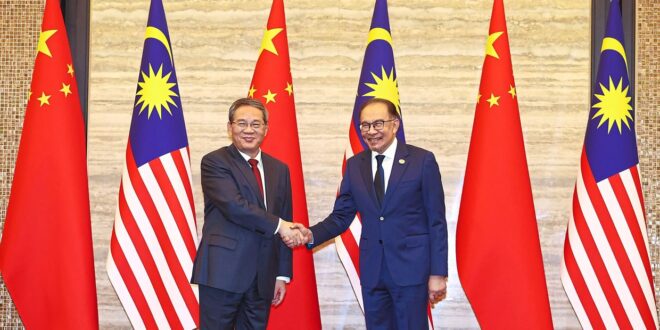PUTRAJAYA: Malaysia-China relations are further cemented with the signing of 14 memorandums of understanding (MOUs), including the renewal of a five-year economic and trade cooperation programme.
The agreements were part of the 50th anniversary of diplomatic relations between the two countries.
The renewal of the “Second Cycle of the Five-year Programme for Economic and Trade Cooperation (2024–2028)” was one of the 14 MOU exchanged between Malaysia and China at the Prime Minister’s Office here yesterday.
Chinese Premier Li Qiang had earlier met with Prime Minister Datuk Seri Anwar Ibrahim at Perdana Putra before witnessing the exchange of the MOUs.
Investment, Trade and Industry Minister Tengku Datuk Seri Zafrul Abdul Aziz exchanged the bilateral agreement to renew the economic and trade cooperation pact with his counterpart Wang Wentao, who is the Commerce Minister of China.
The ministry also exchanged two other MOUs with China to strengthen investment cooperation in the digital economy and green development.
ALSO READ: ECRL project a showcase of close cooperation
Another highlight was an MOU that would allow Malaysian durian farmers to export fresh durian instead of frozen ones to China starting this year.
Agriculture and Food Security Minister Datuk Seri Mohamad Sabu exchanged the MOU with Chinese Ambassador Ouyang Yujing.
The bilateral agreement will allow Malaysia – one of the world’s biggest durian producers – to join its neighbours Thailand and Vietnam in exporting fresh durian to the Chinese market.
ALSO READ: New benchmark to propel ties to greater heights
According to Mohamad, Malaysia’s durian exports from 2018 until 2022 have seen a 256.3%, or RM822.2mil, increase.
“In 2022, Malaysia’s global durian exports recorded a total value of RM1.14bil.
“As a whole, durian is the main contributor (58.6%) to the value of fruit exports in 2022, worth a total of RM2.01bil,” he said.
ALSO READ: What are the M’sia-China MOUs?
Mohamad said durian exports are projected to grow to RM1.8bil by 2030.
Malaysia and China also agreed to review visa-free travel arrangements, as well as combat and prevent transnational crimes between the two countries.
Malaysia and China also pledged to set up a Joint Working Group on Single Window Cooperation to allow both countries to further discuss and study the best approaches to cooperation.
According to Anwar, the joint working group enables Malaysia and China to improve the efficiency of transboundary trade through the digitalisation of trade regulatory processes.
This would eliminate the need to submit redundant documents and would encourage the exchange of information between the two countries.
ALSO READ: Durian diplomacy: Premier Li salutes Malaysia-China’s shared resilience, marks 50 years of fruitful relations
“Efforts to develop this single-window cooperation are in line with the aspiration of the Madani economy framework, which emphasises digital transformation and facilitates businesses to stimulate the national economy,” Anwar said in a statement.
Meanwhile, Science, Technology and Innovation Minister Chang Lih Kang said the MOU for the Science and Technology Expertise Exchange Programme was an extension of an earlier agreement signed between the two countries on Oct 4, 2013.
The MOU will include exchange programmes between scientists and researchers, partnerships between research institutions, and a joint organisation of academic programmes and conferences with the involvement of international scientists and researchers.
“The Science, Technology and Innovation Ministry, as the leader of science, technology and innovation in the country, has also set priority areas with high growth and high value (HGHV), especially technology-based industries such as hydrogen, artificial intelligence (AI), biotechnology and space technology,” said Chang.
Li’s Malaysia visit is the last leg of a regional trip after New Zealand and Australia as China seeks to expand its influence in the Asia-Pacific region amid geopolitical tensions with the United States.
China has remained Malaysia’s largest trading partner for 15 years since 2009, with trade amounting RM450.84bil last year.
 BeritaKini.biz Berita Viral Terkini di Malaysia
BeritaKini.biz Berita Viral Terkini di Malaysia





